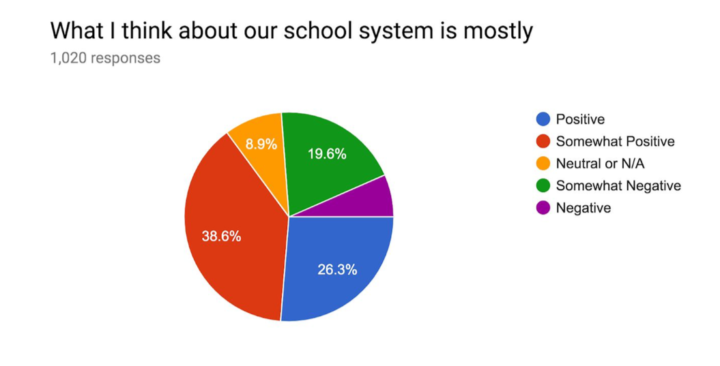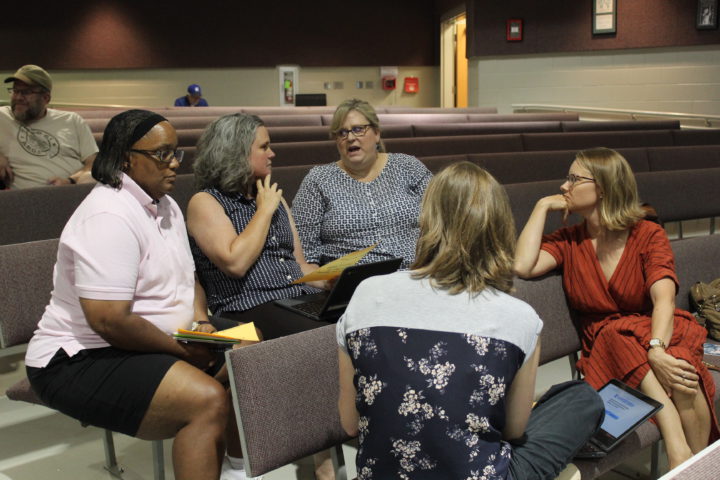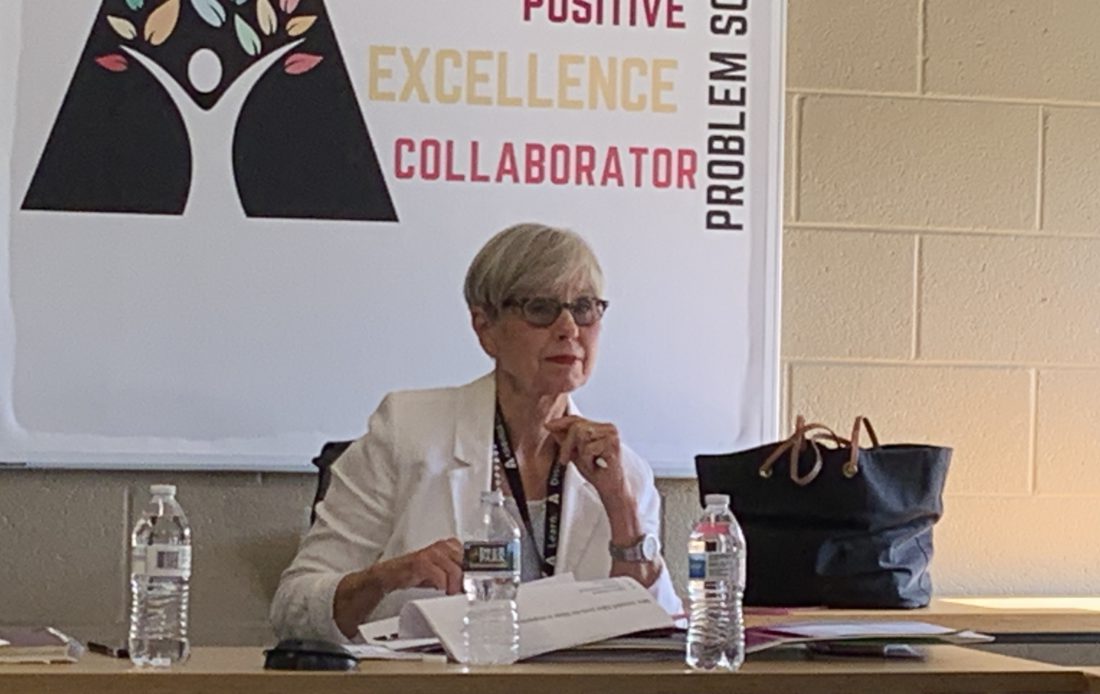Over the past two years, Bobbie Short has enjoyed the pleasures of retirement: working in her North Asheville yard, serving on the boards of local nonprofits and planning an at-home wedding for her daughter.
But with school back in session things have changed, both in Short’s schedule and her household. For one thing, her husband is now back on dinner duty. “If he wants to eat when I’m working, he has to cook,” she explains.
For the third time in six years, Short has been tapped to lead the Asheville City Schools through a transition. She served stints following the 2013 retirement of Superintendent Allen Johnson and the February 2017 departure of Superintendent Pamela Baldwin, who left to take the top job in the Chapel Hill-Carrboro City Schools. In the wake of Superintendent Denise Patterson’s June resignation for medical reasons, Short is on board for yet another tour of duty.
“I am excited, especially with kids coming back,” she told Xpress at an Aug. 7 public event. “I just love kids and like to be around them.”
During her previous stints, parents and teachers alike praised Short for her hands-on, personal approach. She served as superintendent of the Watauga County Schools from 2003-08 and was a teacher, elementary supervisor, principal and assistant superintendent in the Buncombe County Schools before that.
“I mostly try to make being in school my priority, to see what kids are doing and what teachers need and what schools need,” she explained. To that end, she noted, “I’ve been trying to help make sure we’ve got the resources available,” though she stressed that, at that point, she’d been back on the job less than three weeks.
The interim superintendent is taking over as the district struggles with extreme disparities in the academic performance of its white and black students, which are the largest of any district in the state (see sidebar, “2019 Xpress Coverage of the Asheville City Schools”).
Homecoming
Short’s isn’t the only face from the past that’s back in the 2019-20 lineup. Charlie Glazener, the city schools’ former executive director of communications and public relations, has also returned to pitch in while the district searches for its next permanent superintendent. Glazener says he’ll work with Executive Director of Communications Ashley-Michelle Thublin for up to 30 hours per week during the transition period.
At an Asheville City Board of Education work session on Aug. 5, Glazener asked board members to overlook the horizontal crease across the leg of his gray dress pants. “They’ve been on the hanger for 23 months,” he joked.
On June 27, prior to Short’s reappointment, the board approved a $65-an-hour consulting contract with Veronika Gunter for public relations services, but that arrangement appears to be coming to an end.
“I think she’s still on contract, but I think it’s significantly diminished from what it was,” Glazener said when asked about her role. “That’s all I know, because that’s a board decision. Ashley-Michelle and I have already taken over all the forms and the survey process, so I’m not sure what else was on her plate in the short term.”
Community feedback
Thublin, meanwhile, told board members that the system had received over 1,000 responses to its superintendent selection survey, which closed on July 28. That’s more than a 100% increase over the response to the 2017 survey conducted prior to Patterson’s hiring, she said. The current survey was designed to illuminate community members’ feelings about the school system and priorities for its next leader. Two other questionnaires, tailored to district staff and students, respectively, will be made available to members of those groups in the coming weeks.

More than a quarter of respondents to the community survey said they have a negative or somewhat negative impression of the system, a number Thublin called “too high.”
For 34% of respondents, “knowing whom to ask for help” when things go wrong at school was described as hard or somewhat hard.
Looking ahead, respondents said the most important quality they’d like to see in the new superintendent was the ability to help meet students’ social, emotional, mental and physical health needs. Other key characteristics, in order of popularity, were: leadership skills for implementing changes and providing training; strong interpersonal skills; expertise in curriculum; and the ability to manage people, money, programs and facilities.
In terms of candidates’ credentials, survey takers gave top marks to prior experience as a schoolteacher or other school-based staff member. Experience working with children and adults living in poverty ranked second in importance, followed by racial equity training.
In their own words
“I’d like a superintendent who is a resident of Asheville, understands the history of Asheville and the district, and has experience as a teacher and administrator,” wrote one representative respondent.
“Equity mindset. Uplift our students of color,” urged another.
Other write-in comments stressed such factors as: communication skills; having a vision for eliminating the system’s academic achievement gap; spending time in schools with students and teachers; pedagogical knowledge and expertise; and providing inspiring leadership to boost staff morale.
At the Aug. 5 work session, Glazener also cited a number of negative community perceptions about the current state of the Asheville City Schools. They include: a sense that the teacher turnover rate is high; that principals and teachers are undermined by a heavy-handed central administration; that the central office is overstaffed while school-based resources have been reduced; that the district is more focused on helping low-achieving students than on serving what he called “high flyers”; and that the district’s ICS Equity process hasn’t provided teachers with practical ways to address the achievement gap. (See sidebar, “Does ACS Have a Teacher Turnover Problem?”)
About 800 of the 1,022 survey respondents reported living in the district. Roughly the same number said they currently have children attending the Asheville City Schools. Almost 74% of respondents were female, and the majority were 30-50 years old. Over 80% of respondents were white; 8.6% identified as black.
Road show
In addition to the surveys, the district has scheduled several public input sessions. The second such gathering, held Aug. 7 at Ira B. Jones Elementary in North Asheville, drew about 30 attendees. They used cellphones and district-provided laptops to enter responses to a variety of questions into a web-based survey tool. Facilitators Copland Rudolph of the Asheville City Schools Foundation and ACS staffer Marta Alcala-Williams also encouraged participants to engage in small-group discussions.

The digital format, which is increasingly being deployed at public input sessions and other events in Asheville and beyond, produces slick charts and graphics on the fly and collects feedback from multiple sessions into one consolidated report. Judging by the client lists posted on the websites of Mentimeter (the system the city schools are using) and competitors such as PublicInput.com, digital participation apps are catching on across the country.
Board members praised the methodology, and Short commented: “I think this process is great, don’t you? I just think it’s efficient, in terms of capturing what people think.”
Several attendees at the Jones Elementary meeting said they liked providing responses via the Mentimeter app; one father pointed out that not everyone feels comfortable standing up and speaking in a public meeting.
Still, watching the silent residents, heads bent over their phones and index fingers and thumbs flying, it was possible to feel nostalgic for older, messier forms of civic participation. At least one attendee seemed to share that sentiment, telling Xpress that the questions asked didn’t get at issues she wanted to raise.
Applications for the position will be accepted through Wednesday, Sept. 18, and the Board of Education will interview candidates in October and November. On June 27, board attorney Chris Campbell advised the board against making the names of finalists public before offering one of them the job, saying a confidential process would attract a larger number of qualified candidates.
While the board hopes to announce its pick in November en route to a January start date, Campbell also warned that the top prospect might insist on finishing the school year in his or her current district before taking up the reins here. In that case, the new leader wouldn’t begin work until next summer.
That means Short’s husband could be on dinner duty for the foreseeable future. And just as the interim superintendent’s meals may often have to await her late arrival, so too must local hopes for a long-term vision for the Asheville City Schools.






What an absolute cluster of crap… and NO real equity nor inclusion … and lots of INequity and exclusion by a bunch of elitist exclusionists…the crowd again running it is WHY ACS is
such a poor performing district! WHEN will you people stop feeding this superior oppression in Asheville? Get YOUR child OUT of ACS as FAST as you CAN!